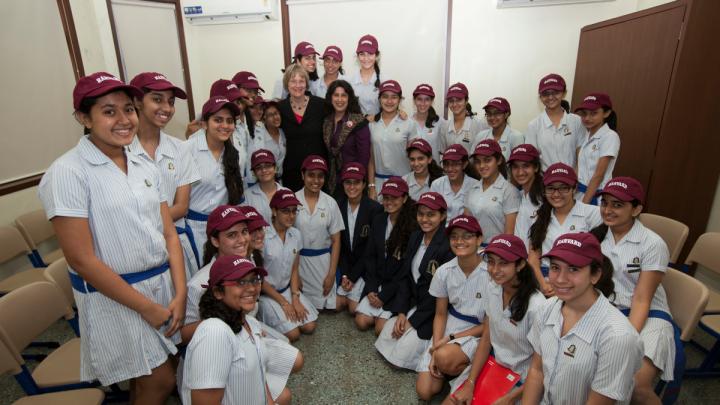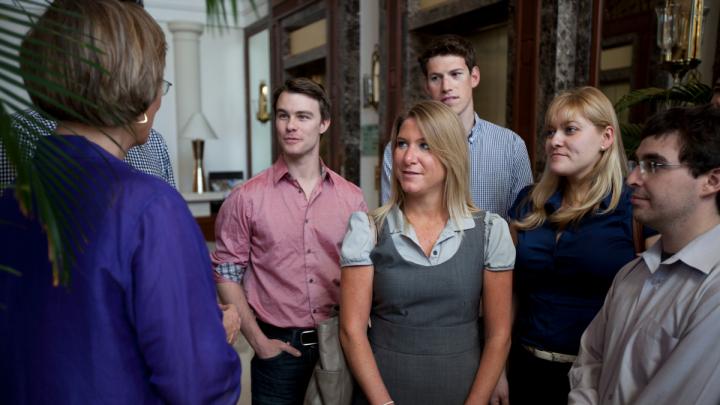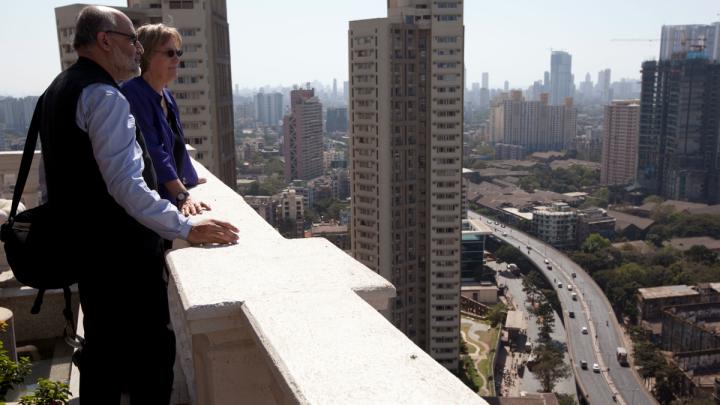Associate editor Elizabeth Gudrais reports from Mumbai:
The world may be flat, with technology enabling robust international collaboration and commerce, President Drew Faust told an audience at the University of Mumbai today, alluding to Thomas Friedman’s global bestseller, The World Is Flat. But for all its frenetic economic activity, Faust said, such a world requires that the tradition of liberal-arts education persist.
“Connectivity and mobility,” she said, “do not necessarily confer understanding”: when communication across national borders occurs easily and instantaneously, people tend to assume that cultural differences can be transcended just as easily. “The world is, in one sense, flatter, but it is also many-featured and complex,” she continued. “Our aim at Harvard is to give students the tools needed to navigate a world that is flat and not flat—the tools needed to adjust to the circumstances of life, however surprising they may be.”
Faust spoke at the university, one of India’s largest and oldest, during a weeklong visit to the South Asian nation. Before the speech, students serenaded her with the school’s anthem, and she was presented with a glass-encased statue of the convocation hall in which she spoke. Vice chancellor Rajan Welukar called it “the happiest day in the history of the University of Mumbai.”
In her speech—given before a crimson curtain, in whose folds hung celebratory garlands of orange and yellow flowers—Faust quoted leaders from India’s history, including Jawaharlal Nehru, independent India’s first prime minister, and Rabindranath Tagore, the revered poet who won the 1913 Nobel Prize in literature. Calling on famous words from Tagore, Faust said, “Work driven by pure necessity is in ruins when necessity changes course.” India, of all places, highlights the immediate impact that work in business, public health, and other disciplines can have, she said. But she challenged her listeners, and all of academia, to “maintain our deepest commitments to inquiry fueled by curiosity, to knowledge pursued for its own sake.”
Faust, who had arrived two days earlier, said she immediately noticed the city’s energy and vibrancy. India is a young country—the median age is 26—and this presents an opportunity: she noted that India’s minister for human resource development, Kapil Sibal, LL.M. ’77, has set a goal of raising the proportion of Indians who go to college from 15 percent now to 30 percent by 2020. (The University of Mumbai alone has an astonishing 650,000 students across all its campuses.)
Mumbai is also a young city as far as Harvard is concerned. Although Business School alumni there have long maintained connections, recently arrived College graduates are now bringing new life to the local, University-wide, Harvard club. Faust spent part of her time in Mumbai with current undergraduates and graduate students, learning about projects such as a design studio (led by the Graduate School of Design, but pulling in perspectives from law and business students as well) that will make recommendations for optimizing the use of Mumbai’s port. Many of the 160 attendees at an alumni reception, held the evening before Faust’s university speech, were in fact students (mostly from the schools of business, law, and public health), including a number visiting the area during January term.
Faust’s schedule in Mumbai also included a visit to a high school for girls and a tour of the University’s South Asia Initiative’s office in the city. Her itinerary takes her next to Delhi, where she will speak at an education symposium and meet more alumni, among other appointments.










